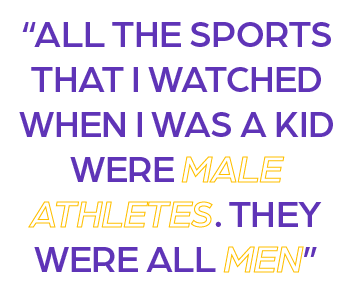By Julia Lawrence
To be a fan means to connect with another person, often a complete stranger. For some, this could be an author, a singer or even an athlete.
Sports fans, no matter the game, are widely accepted for their screaming, face painting and willingness to spend thousands of dollars to see their favourite teams play. They have integrated fandom into their daily lives by wearing jerseys on a random Wednesday and supporting their preferred teams on social media.
Emily Simonetta, a third-year sport media student at Toronto Metropolitan University (TMU), has been part of the sports community since birth, both as a fan and an athlete.
Having worn jerseys since she was a baby, Simonetta knows firsthand the male-dominated nature of the industry and how this narrow-minded gender stereotype exists for sports fans.
“All the sports that I watched when I was a kid were male athletes. They were all men,” she said. “In high school, it was definitely harder to be motivated to get into sports…It was ‘you don’t know much about sports’ stereotypical guy talk.”
A Sociology of Sport Journal study on the associations between gender, sexuality and sports fan identities found that men are more likely to self-report higher levels of sports fanatacism compared to women and non-binary sports fans. In the United States, sport was traditionally viewed as a “predominantly masculine social institution,” the study states. Still, recent discussions as outlined in a 2017 article by The Conversation indicate women and non-binary identifying sports fans are here to stay.
The level of fandom Simonetta and other women-identifying sports fans exude can also be found in the music industry, specifically with fangirls. However, it’s often faced with more criticism.
Like the sports community, fangirls enjoy being devoted fans of musical artists and groups, commonly known as ‘stanning.’ They too can be found on a random Wednesday wearing a concert tee and spreading the same enthusiasm of their love online.
Yet, they’re often portrayed as younger and more feminine.
Collins Dictionary describes a sports fan “as a person who is enthusiastic about sports.” However, a fangirl is “a girl or young woman who is very enthusiastic about and interested in a particular thing such as a film, entertainer, or type of music.”
The gendered definition of fangirl is limiting, classifying those who enjoy film or music with the notion that these things must be more feminine. Sports are often not included as hobbies a young woman can enjoy. And, if women do find themselves enjoying sports, they must remove their overenthusiastic passion for fandom to fit in.

While TMU students who are part of these fan bases do occasionally hear these stereotypes in social situations, they believe it’s the clickbait media that has fueled these negative conversations.
Rohan Goswami, a second-year biomedical sciences student, said he feels the media hyper-focuses on the few “cringy” or very obsessive music fans rather than the whole fandom and the good they’ve done.
“They don’t ever portray the full picture,” he said. “I don’t engage in media that is like, ‘Oh my god, 12 BTS ARMYs did this.’ It doesn’t show up on any of my social media because I don’t interact with that kind of content to begin with.”
Leaving the Caribbean island Saint Martin to attend university, Goswami brought his love for K-pop and found a community of ‘stans’ through free dance classes at TMU. He said they now ignore the clichés put up against the fandom.
“When someone else actively has that perception of me, it’s amusing to me because why do you still think like that in 2024? I just listen to a music group. It doesn’t mean anything.”
Goswami’s sentiments are shared by the founder of the Asian entertainment newsletter bunni pop, Samantha Lui. She tries to avoid the negative perceptions of fangirls in her reporting as much as possible.
Fascinated by fandom culture, Lui makes her newsletter accessible to people who may not know too much about K-pop or Asian entertainment as a whole. She makes a point to build a relationship with the fans before starting her reporting as a way to gain trust.
“People are skeptical of media and how we portray things because we don’t necessarily [always] get them right,” she said.
She said if the media has stereotypes and misogyny within its reporting, it affects the fan bases by building shame over having an interest in things like boybands.
Similar to fangirls, women and non-binary identifying sports fans are also often shamed for their behaviour. Some of them have dealt with strangers on the subway saying they aren’t real fans or they are only watching for the players’ looks, as previously reported by The Eyeopener.
Taylor Swift and her boyfriend, Kansas City Chiefs tight end Travis Kelce, are a prime example of the double standards men and women-identifying sports fans face.
There has been mixed coverage of their relationship—from negative reports about Swift’s presence on TV during games to positive articles on how the two fan bases, Swifties and the Chiefs, came together online.
Sports fan and former music writer Çetin Cem Yilmaz said the pairing has helped people on both sides break down prejudice over who can be a sports fan.
“I was seeing many Taylor Swift fans in the comment section of the NFL…They weren’t just happy to see Taylor Swift in the stands. They wanted to know the rules, they wanted to be involved in the whole thing,” he said.

Yilmaz said he believes the NFL benefited from the Swifties. In a survey by Numerator, a data and tech company, 12 per cent of people said they planned to watch the Super Bowl if Swift appeared.
Simonetta said she believes if the Swift-Kelce situation was reversed, men wouldn’t receive as much hate as women have seen trying to get into the sport.
“If you were watching the WNBA and one of the players was dating a massive football player and then all the guys started watching women’s, I don’t think it’d be treated the same way,” she said. “There’s a standard there.”
Since entering sport media at TMU, Simonetta focused on surrounding herself with positivity.
“The biggest thing for me is treating everyone the same. It doesn’t matter what way of life you come from, what you identify as, or what sport you do and don’t like. It all just needs to be a supportive community because that’s how people succeed,” Simonetta said.
In terms of reporting, she said she hopes in the future, the media will report these games as just a sport rather than focusing on gender.
“In the future, I hope to see it’s ‘they’re playing hockey,’ not ‘playing women’s hockey,’” she said.
Often, women-identifying sports fans must create their own community as most feel pushed out of male-centric spaces, according to a 2019 study in Communication & Sport.
Sports reporter and content creator Emmy Curtis has a following of 80 per cent women on TikTok. While her first videos got hate comments from people, her community has stood up for her consistently since.
“This community we built is so strong. If there’s one hate comment, there’s five followers already in my comment section saying, ‘Who do you think you are?’” she said. “The girls have my back.”
Third places, spaces where people spend time between home and work, can be on social media where sports fans and fangirls can create supportive environments that are crucial for fanbases to survive.
Lui realized this since joining fandoms at an early age and continues to rewrite how fangirls, of any form of entertainment, are seen.
“I hear people talk about the Jays, the Leafs, the Raptors all the time. They buy their memorabilia, they go to the game, and they have season tickets. Is that different from wanting to consume content for a band?” she said. “It’s not that different, in my opinion.”
Whether someone is a fan of a team that throws a ball around a large field of grass or a fan of a seven-membered boy group from South Korea, sports fans and fangirls agree that as long as their choices of fandom bring them joy, it shouldn’t matter.
That is how Lui said she sees it.
“It’s someone’s way of trying to find a connection in the world through a shared passion.”











Leave a Reply